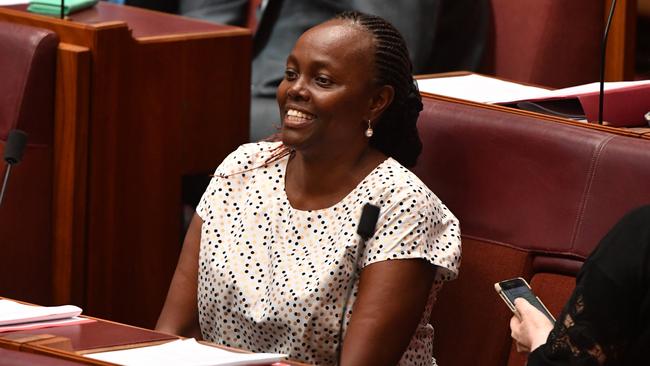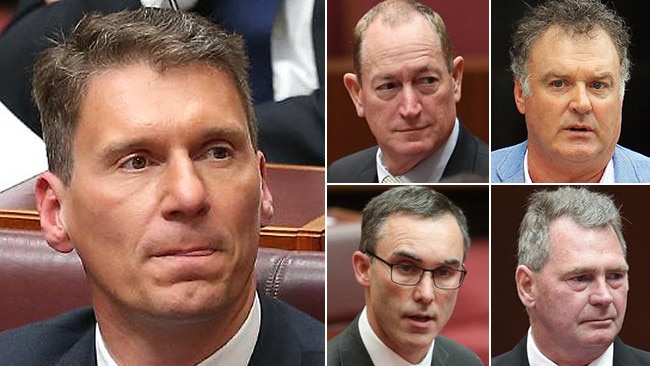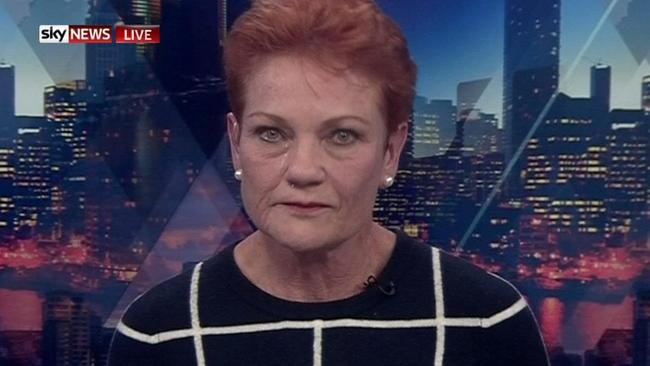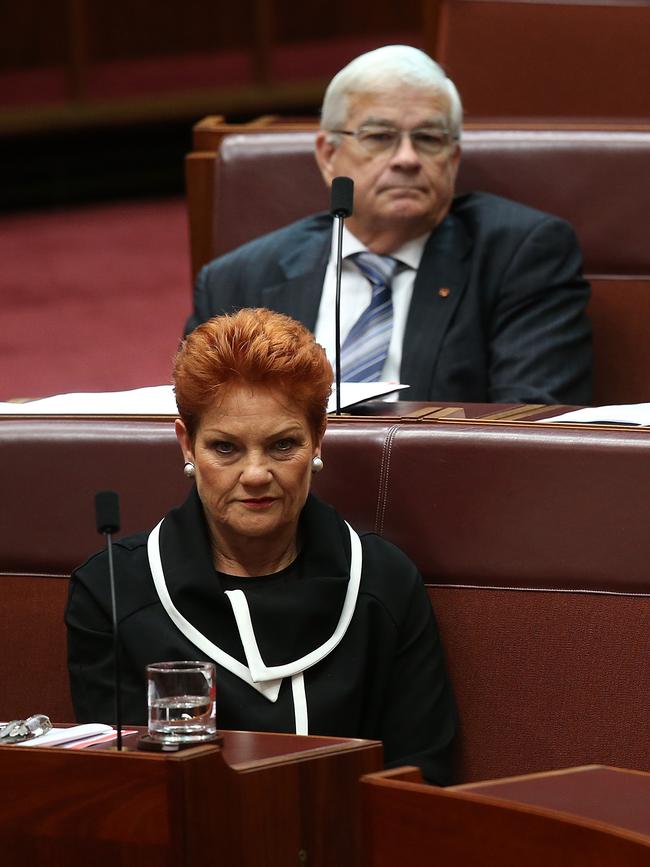
How much longer can the farce of the Senate continue? How much longer can election outcomes, party loyalty and democratic values be trashed in a performance that mocks the public interest?
The One Nation fiasco reveals not just the failures of Pauline Hanson’s party but structural and cultural flaws that plague the Senate. Its defenders offer the absurd excuse that this is democracy in action. In truth, the Senate is basic to the dysfunction of our politics; it is a risk to our governance and ultimately our living standards.
Since the 2016 double dissolution, 16 of the 76 senators elected have left the chamber, the result of ineptitude, breaching section 44 of the Constitution, unacceptable behaviour and personal convenience (this includes Lee Rhiannon, who is leaving in August). It is a dropout rate of about 20 per cent in just two years, a turnover that generates instability worthy of a banana republic.
You don’t have to think Italy to find a failure of the system. In the 117 years of our national parliament there is no precedent for this chaos. Central to the dysfunction are the minor parties and independents. They are not the sole cause of the problem but they carry the major responsibility.
Of the 20 crossbenchers (including Greens) elected in 2016, only 11 remain — that’s a dropout rate of 45 per cent in two years. Is there a chamber in another major democratic country that remotely resembles this? Put another way, of the 16 senators who have departed, nine are from the Senate crossbenches.
While much of the casualty rate stems from section 44 — this claimed 10 — another six resigned in just two years, triggering the casual vacancy constitutional provision and suggesting a convenient degree of cynical manipulation of this.
Swapping parties is now a habit in this careless Senate. That so many “replacement” senators have been appointed encourages such self-interested transactions. You take the best deal to maximise your chances of survival. According to my calculations, six senators have changed parties or changed allegiance from the party they were initially appointed to represent (that’s about 8 per cent of the chamber) and two of them have changed twice. How does that sit with democratic integrity?

Lucy Gichuhi was appointed as a Family First senator, became an independent and then a Liberal. Cory Bernardi left the Liberals just a few months after being elected, to establish the Australian Conservatives. Fraser Anning was declared elected by the High Court to replace a One Nation senator, sat as an independent and this week announced he was joining Bob Katter’s Australian Party.
Steve Martin was declared elected to replace Jacqui Lambie but after a dispute with Lambie over her outrageous demand he stand aside for her to return, he became an independent and more recently joined the Nationals. Rod Culleton left One Nation and became an independent before he was found to be ineligible to sit as a senator. Tim Storer was declared elected to replace a Nick Xenophon Team senator but decided to sit as an independent.
Nobody would condemn all independent or minor party senators as a group. A number are dedicated and professional. Yet they should be judged according to the promises they made — and the majority refrain from these senators is they exist to improve the system, restore trust and integrity. Recall Nick Xenophon’s pledge to fix “the lack of trust in politics and voter disillusionment”.
Let’s talk truth to this refrain — it is complete nonsense. The record of these minor parties shows they are just as much, if not more, cynical, deceptive and self-interested than the major parties they complain about.

There is nothing exceptional about the circus convulsing Hanson’s One Nation. It is merely an extreme version of what has played out before with the collapse of the Palmer United Party, which had three senators and one House of Representatives seat after the 2013 election, only to lose them all in 2016. Indeed, the party had a role in the fall of the Abbott government.
A related pattern occurred with the Xenophon Team, which had three senators and a House of Representatives seat at the 2016 election. Deluded by hubris, Xenophon quit the Senate to run at the South Australian election but lost. The Xenophon party has gone into oblivion. A new party called Centre Alliance has replaced it, with only two senators: Stirling Griff, an original Xenophon candidate, and Rex Patrick, who replaced Xenophon.
The Jacqui Lambie Network and Family First, each with one senator elected in 2016, now have none. Australian Conservatives and the Bob Katter party, with no senators elected in 2016, now have one each.
Hanson was elected that year with a four-strong Senate team, the largest minor party after the Greens. She is down to three but has demanded in writing that Brian Burston quit the Senate to enable her to determine a replacement. Burston refuses — he says if Hanson sacks him from the party he will sit as an independent. What else would he do? Anning predicts the other remaining One Nation senator, Peter Georgiou, who had replaced Culleton, will separate from Hanson. If that happened, her team of four could be reduced to one — herself.
Because of Coalition-Labor differences, the crossbenches exert a decisive impact on the nation. They can determine tax policy, superannuation and industrial policy, education spending and budget measures. How do you feel about that? Are they fit and proper for the task?

Recent revelations by this newspaper show the chaos within One Nation over two decisive policy issues. The first was the anger Hanson provoked when she betrayed the government over the agreement with Senate leader Mathias Cormann to support corporate tax cuts. Burston refused to accept this breach of faith. “Once I make a handshake with somebody — that’s it,” he said. The second was Burston’s revelation that it was One Nation senator Georgiou who refused to back the government’s public interest test to prevent the merger of the radical construction and maritime unions. Georgiou, lobbied by the unions, made the hysterical comment that the bill was akin to a “1939 Nazi Gestapo” move, the upshot being the government had no chance of getting the numbers.
Is this a mature democracy in action? Such rifts testify to a bigger theme: minor parties built around a personality — Hanson, Xenophon or Palmer — are unstable and under pressure lack sufficient unifying purpose.
The Senate these days is the product of three forces: the late 1940s embrace of proportional representation as a voting system, the erosion of support for the major parties and the survival of the nexus that means the size of the Senate increases with the lower house, and as the Senate expands so the quota for election to the Senate falls, thereby helping to entrench the minor parties.
They have held the Senate balance of power for much of the past 40 years but the situation today is different. This is because today’s minor parties are creations of populist disruption and grievance. By comparison, the Australian Democrats a generation ago, founded to “keep the bastards honest”, seem like models of responsibility and public interest.
Former Labor Senate leader John Faulkner said in 2003: “Today the Senate’s key role is scrutiny” and this was an “important tool for enhancing Australian democracy”. Would Faulkner say the same today? The Senate is a different chamber from 2003.
Its main function is no longer as a house of review or scrutiny or keeping the government honest. It operates as a legislative chamber in its own right, pursuing the self-serving agendas of its big and small parties. There is no respect for a government’s agenda, a debacle driven by the major parties themselves. What counts for the minor parties is delivering financial rents to their narrow constituencies. Sadly, the public is so alienated, it will continue to vote for dysfunction, and governments will just look more ineffective.



